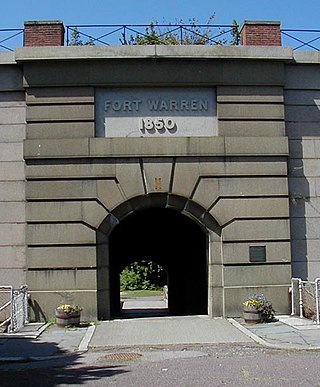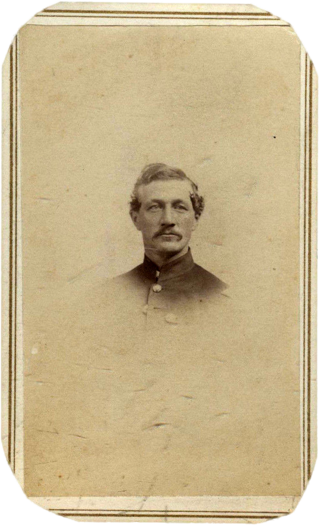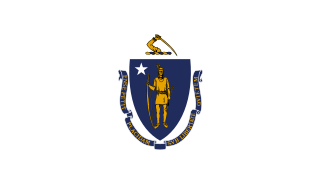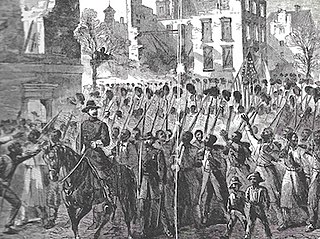
The Commonwealth of Massachusetts played a significant role in national events prior to and during the American Civil War (1861–1865). Massachusetts Republicans dominated the early antislavery movement during the 1830s, motivating activists across the nation. This, in turn, increased sectionalism in the North and South, one of the factors that led to the war. Politicians from Massachusetts, echoing the views of social activists, further increased national tensions. The state was dominated by the Republican Party and was also home to many Republican leaders who promoted harsh treatment of slave owners and, later, the former civilian leaders of the Confederate States of America and the military officers in the Confederate Army.

Daniel Fletcher Webster was an American diplomat and Union Army officer. He was the son of Daniel Webster, the 14th and 19th U.S. Secretary of State.

The 22nd Regiment Massachusetts Volunteer Infantry was an infantry regiment in the Union army during the American Civil War. The 22nd Massachusetts was organized by Senator Henry Wilson and was therefore known as "Henry Wilson's Regiment." It was formed in Boston, Massachusetts, and established on September 28, 1861, for a term of three years.
The 53rd Massachusetts Volunteer Infantry was an infantry regiment recruited in Massachusetts for service in the American Civil War. The volunteers, mostly farmers, predominantly hailed from north-central Massachusetts.

The 9th Regiment Massachusetts Volunteer Infantry was a military unit from Boston, Massachusetts, USA, part of the Army of the Potomac during the American Civil War. It is also known as "The Fighting Ninth". It existed from 1861 to 1864 and participated in several key battles during the war. The unit is an Irish heritage unit, with many volunteers having been born in Ireland.
The 61st Regiment Massachusetts Volunteer Infantry was an infantry regiment raised for one year's service in the Union Army during the American Civil War from 1864 to 1865.
James Lawrence Bates was a colonel in the Union Army during the American Civil War who was awarded the honorary grade of brevet brigadier general after the war. He was born in Weymouth, Massachusetts, and, in civilian life, was a merchant in the leather trade.

Arthur Forrester Devereux was a captain in the Massachusetts Volunteer Militia prior to the Civil War and a colonel in the Union Army during the Civil War. He is notable for his expertise and proficiency in the instruction of military drill. During the Battle of Gettysburg, the 19th Massachusetts Infantry, under his command, played an important role in filling a breach in the Union lines during Pickett's Charge. After his active service had concluded, Devereux was awarded the honorary rank of brevet brigadier general, United States Volunteers, by appointment of President Andrew Johnson on February 21, 1866, to rank from March 13, 1865, and confirmation by the U.S. Senate on April 10, 1866.

The 32nd Regiment Massachusetts Volunteer Infantry was an infantry regiment in the Union army during the American Civil War. The nucleus of the regiment was a battalion of six companies raised in September 1861 to garrison Fort Warren, the largest fortification in Boston harbor. The battalion was originally known as the 1st Battalion Massachusetts Infantry or the Fort Warren Battalion.

James Adams Cunningham was a volunteer officer in the Union Army during the American Civil War.

The 2nd Regiment Massachusetts Volunteer Infantry was an infantry regiment in the Union Army during the American Civil War. Major George H. Gordon, a West Point graduate and veteran of the Mexican–American War, organized the unit's recruitment and formation. The 2nd Massachusetts was trained at Camp Andrew in West Roxbury, Massachusetts on the site of the former Transcendentalist utopian community, Brook Farm. Roughly half the regiment was mustered in on May 18, 1861 and the remainder on May 25, 1861 for a term of three years. The regiment saw extensive combat as part of the Army of the Potomac particularly during the Battle of Antietam and the Battle of Gettysburg.
Joseph Cushing Edmands was a volunteer soldier in the Union Army during the American Civil War who attained the grade of colonel and in 1866 was awarded the honorary grade of brevet brigadier general.

The 11th Massachusetts Infantry Regiment was an infantry regiment in the Union Army during the American Civil War. Organized in Boston in May 1861, the 11th Massachusetts Infantry was made up mostly of men from Boston, but also from Charlestown and Dorchester. The leading force behind the formation of the regiment was its first colonel, George Clark Jr., who had been an officer in the Massachusetts state militia. The regiment was known as the "Boston Volunteers."
DeWitt Clinton Baxter (1829–1881) was an American artist and engraver. He also served as colonel and brevet brigadier general in the Union Army during the American Civil War.

The 13th Regiment Massachusetts Volunteer Infantry was an infantry regiment in the Union Army during the American Civil War. It was formed on July 16, 1861, at Fort Independence in Boston, Massachusetts. Its original commander was Colonel Samuel H. Leonard.

Jedediah Hyde Baxter was a career United States Army officer and doctor who attained the rank of brigadier general as Surgeon General of the United States Army.

The 55th Massachusetts Infantry Regiment was the sister regiment of the renowned Massachusetts 54th Volunteers during the latter half of the American Civil War. The enactment of the Emancipation Proclamation by United States President Abraham Lincoln on January 1, 1863 opened the way for the enlistment of free men of color and newly liberated slaves to fight for their freedom within the Union Army. As the ranks of the 54th Massachusetts quickly reached its full complement of recruits, an overflow of colored volunteers continued to pour in from several other states outside Massachusetts — many of whom simply had not arrived in time — prompting Governor John Albion Andrew to authorize yet another regiment of colored soldiers sponsored by the Commonwealth. Lieutenant Colonel Norwood P. Hallowell of the 54th Massachusetts was promoted to colonel and appointed commander of the 55th Massachusetts on May 30, 1863. Five companies of the 55th Massachusetts were mustered into service on May 31; two more companies were mustered in on June 15; and the last three on June 22.

The 5th Regiment Massachusetts Volunteer Militia was a peacetime infantry regiment that was activated for federal service in the Union army for three separate tours during the American Civil War. In the years immediately preceding the war and during its first term of service, the regiment consisted primarily of companies from Essex County as well as Boston and Charlestown.

The 42nd Regiment Massachusetts Volunteer Infantry was a regiment of infantry that served two tours in the Union Army during the American Civil War. The unit was first formed in September 1862 in response to President Abraham Lincoln's call for 300,000 men to serve for nine months.

The 57th Regiment Massachusetts Volunteer Infantry was a regiment of infantry that served in the Union Army during the American Civil War. It was one of the four "Veteran Regiments" raised in Massachusetts during the winter of 1863–64. Recruits of these regiments were required to have served at least nine months in a prior unit. Colonel William F. Bartlett, at age 24 already a veteran of three regiments, organized the recruiting and formation of the 57th Massachusetts and served as its first commanding officer.
















